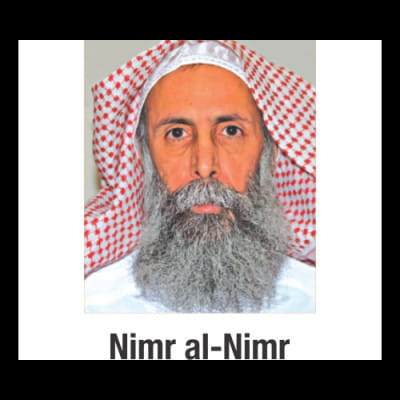Saudi executes 47 for terrorism

Sunni Muslim Saudi Arabia yesterday executed a prominent Shia cleric, who had been behind anti-government protests, drawing angry condemnation from Shia-majority Iran and Iraq.
The execution of Nimr al-Nimr and 46 other men, including Shia activists and Sunnis accused of involvement in al-Qaeda killings, was announced by the interior ministry.
It prompted calls for demonstrations, but the brother of the 56-year-old cleric called for calm in oil-rich Eastern Province where Shias complain of marginalisation.
The interior ministry said the 47 men had been convicted of adopting the radical "takfiri" ideology, joining "terrorist organisations" and implementing various "criminal plots".
A list published by the official SPA news agency included Sunnis convicted of involvement in al-Qaeda attacks that killed Saudis and foreigners in 2003 and 2004.
Some of them had been convicted of taking part in May 2003 attacks on expatriate compounds in Riyadh that killed 35 people, nine of them Americans, the ministry said.
Others were involved in attacks the following year on a housing complex in the eastern city of Khobar, in which 22 people were killed, most of them foreigners, and other assaults.
Among them was Fares al-Shuwail, described by Saudi media as al-Qaeda's top religious leader in the kingdom.
Notably absent from the list, was Nimr's nephew, Ali. He was arrested at the age of 17 and allegedly tortured during detention before being sentenced to die, sparking fury from rights watchdogs and the United States.
All those executed were Saudis, except for an Egyptian and a Chadian.
Some were beheaded with a sword while others were executed by firing squad, said ministry spokesman Mansur al-Turki.
Executions have soared in the country since King Salman ascended the throne last January, with 153 people put to death in 2015, nearly twice as many as in 2014.
Yesterday's executions were condemned by Iran and Iraq as well as the Lebanese Shia movement Hezbollah, and drew protest calls.
"The Saudi government supports terrorist movements and extremists, but confronts domestic critics with oppression and execution," said Hossein Jaber Ansari, spokesman for Iran's foreign ministry.
It will "pay a high price for following these policies," the official IRNA news agency quoted him as saying.
One of Iran's most senior clerics has predicted the fall of Saudi Arabia's ruling family following the execution.
Ayatollah Ahmad Khatami's comments came as Iran's foreign minister warned Saudi Arabia would pay a 'high price' for following policies that led to the execution of al-Nimr and 46 others for 'terrorism offences'.
Turki described Iran's reaction as "irresponsible".
"We are completely confident with what we're doing and we believe in it and do not care how others view our procedures, whether on justice or implementation of sentences," he said.
Tehran ally Hezbollah said Saudi Arabia's rulers are "global criminals" and denounced Nimr's execution as a "heinous crime".
Saudi justice ministry spokesman Mansur al-Qafari said "interference in the kingdom's judiciary is unacceptable".
Rights groups have repeatedly raised concern about the fairness of trials in Saudi Arabia, where murder, drug trafficking, armed robbery, rape and apostasy are all punishable by death.
Iran's Basij student militia, connected to the country's elite Revolutionary Guards, called for a demonstration today outside the Saudi embassy in Tehran.
In Saudi ally Bahrain, dozens of youths from the majority Shia population staged protests to denounce the executions.
The Bahraini government and the United Arab Emirates voiced support for the conservative kingdom, saying the executions were necessary to confront extremism.
Nimr was arrested in 2012, three years after calling for Eastern Province's Shiite-populated Qatif and Al-Ihsaa governorates to be separated from Saudi Arabia and united with Bahrain.
The interior ministry had described him at the time of his arrest as an "instigator of sedition".
A video on YouTube in 2012 showed Nimr making a speech celebrating the 2012 death of then-interior minister Prince Nayef bin Abdulaziz.
The anti-government protests that erupted in eastern Saudi Arabia five years ago coincided with a Shia-led protest movement in Bahrain that was later crushed with help from Saudi troops.

 For all latest news, follow The Daily Star's Google News channel.
For all latest news, follow The Daily Star's Google News channel. 



Comments